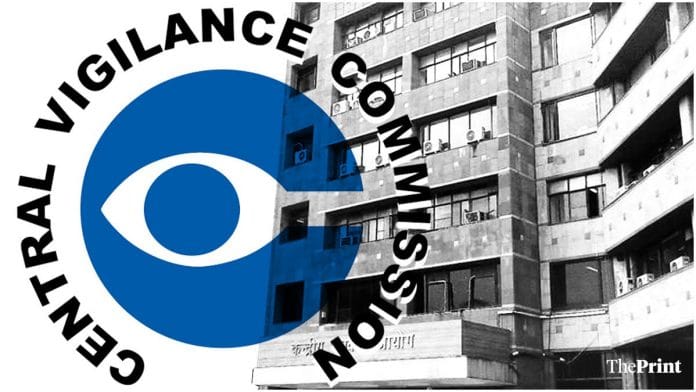New Delhi: The Central Vigilance Commission (CVC), which should be a three-member autonomous body according to the provisions of the Central Vigilance Act, 2003 — has been functioning with only the central vigilance commissioner (who heads the body) since June this year.
The commission last functioned as a three-member body, with a chairperson and two members as defined in the act, in October 2020. That was when one of the two vigilance commissioners, Sharad Kumar, a retired IPS officer, demitted office.
Following Kumar’s retirement, the commission comprised a central vigilance commissioner — Sanjay Kothari — and a vigilance commissioner — Suresh Patel.
“Sanjay Kothari, IAS (Retd.) joined as Central Vigilance Commissioner on 24 April 2020 and Suresh N. Patel, MD & CEO (Retd.) Andhra Bank joined as Vigilance Commissioner on 29 April 2020. Sharad Kumar, IPS (Retd.), Vigilance Commissioner demitted office on 10 October 2020. One post of Vigilance Commissioner has been vacant since then,” states the CVC annual report for 2020.
While Kumar’s position was never filled, in June 2021, Kothari too retired, and the sole remaining commissioner, Patel, was appointed central vigilance commissioner. Since then, both vigilance commissioner posts have remained vacant.
Patel has been both the head of the CVC and its only member since June 2021. There have been no appointments to the committee since April 2020, when both Kothari and Patel had joined the CVC.
ThePrint reached Patel’s office for a comment over phone, but received no response till the time of publication of this report. ThePrint also reached Jaideep Bhatnagar, Principal Director General of the Press Information Bureau through email, and was told that the queries have been forwarded to the department concerned — DoPT under the Ministry of Home Affairs — but there was no response in this case either.
Also read: Doubters of Modi govt’s extension of ED, CBI directors’ tenure, here’s what you’re missing
CVC’s history and role
According to the CVC’s website, it was formed in 1964 on the recommendations of a committee on the prevention of corruption, to advise, guide and recommend to central government agencies in the field of vigilance. It was made a statutory body in 1998, and the Central Vigilance Commission Act was passed in 2003 to give more clarity to its organisation and function.
The Central Vigilance Commission Act, 2003 requires the CVC — the county’s apex vigilance body — to have a central vigilance commissioner (who acts as the chairperson) and two vigilance commissioners as members. All three hold their positions for a period of four years, or till they attain the age of 65 — whichever happens first.
The appointments are made by the President of India, in accordance with the provisions under Section 4 of the CVC Act, on the recommendations of a committee comprising the prime minister, the minister of home affairs and the leader of opposition in the Lok Sabha. When no such leader has been officially recognised, the leader of the single largest group in opposition in the Lok Sabha becomes a member of the committee.
The Parliament this month passed the Central Vigilance Commission (Amendment) Bill, 2021, but the amendment does not concern the appointment or tenure of CVC commissioners in any way, and only seeks to extend the tenure for the director of Enforcement Directorate, which is also mentioned in the CVC Act.
Of the many roles and responsibilities of the CVC, the most important ones include conducting an inquiry or recommending an inquiry or investigation to be made on a reference by the central government, and investigating any complaint received against any official associated with relevant government departments. The CVC is also responsible for appointing the heads of several central government departments and agencies.
Also read: Awards, bonus for quick, quality work — CVC fix for delays, other issues in public projects
‘Undermining institution’
Despite the CVC managing to dispose of the vast majority of complaints with just the one central vigilance commissioner in place, the vacancies have not gone down well with the Opposition.
Adhir Ranjan Chowdhury, leader of the Congress party in the Lok Sabha, termed the vacancies in the CVC as “another instance” of the Narendra Modi government “undermining central institutions”.
“I had raised this issue in the Lok Sabha this (Winter) session. They (the government) only keep telling lies. They called a meeting for the CVC appointment before the pandemic and since then, no meeting has been convened,” Chowdhury told ThePrint.
“After the retirement of the appointed CVC, they promoted a general member as CVC (ad hoc). I think they (government) are not getting a trusted person who can be appointed as CVC,” he claimed.
“The seriousness of the commission has been diluted as it is meant to function with a full bench which includes a central vigilance commissioner and two vigilance commissioners,” the Congress leader added.
(Edited by Poulomi Banerjee)
Also read: ‘Whistleblower’ Tathagata Roy wants to ‘expose the corrupt in BJP’, party calls him a liability






